What are you looking for at Aqrani library?
-
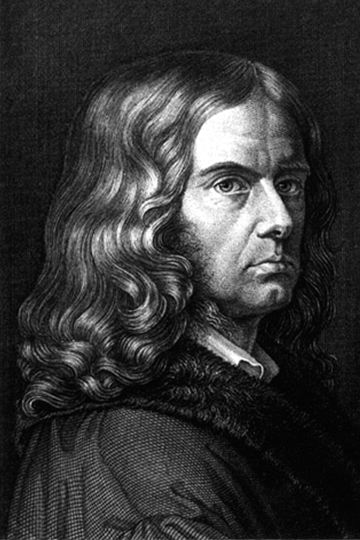
Adelbert von Chamisso
In 1790, to escape the French Revolution, Louis-Marie count de Chamisso and his wife Anne Marie, born Gargam, left France with their seven children to go successively to Liège, to The Hague, in South Germany (to Wurzbourg, to Bayreuth), then to Berlin. A turning point that will mark the life of the child’s youngest, Louis-Charles-Adélaïde. «My homeland: I am French in Germany and German in France, Catholic among Protestants Protestant among Catholics, philosopher among religious people and cagots among people without prejudices, man of the world among scholars, is pedantic in the world, jacobin among aristocrats, and among democrats a nobleman, a man of the former Regime, etc. I am nowhere to be found, I am everywhere foreign – I would like to hug too much, everything escapes me. I am unhappy… Since tonight the place is not yet taken let me go and throw myself head first into the river…” In 1796 the queen of Prussia, Frédérique-Louise d'Hesse-Darmstadt, admitted him to his service as a page. In 1798, he entered the Prussian army, obtaining, on March 31, a certificate of aspirant to the regiment of Gœtze, in garrison in Berlin. On January 24, 1801, he was promoted lieutenant. It was at this time that he adopted the name Adelbert, more manly. Although his family was allowed to return to France, Chamisso preferred to stay in Germany to continue his military career. Since he received only a modest education, he devoted his moments of freedom to learning.
-
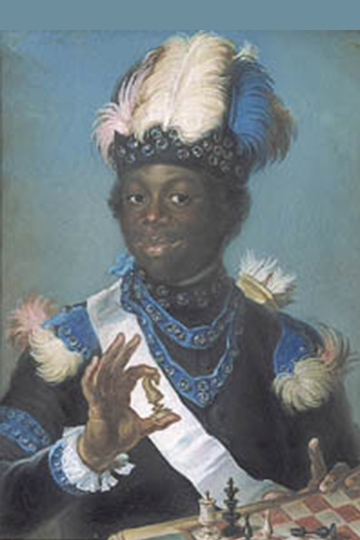
Adolphe Badin
Adolphe Badin (also known as Couschi) who was born a slave in the Danish colony Saint Croix in 1747. Bought for $10 and taken to Europe by a Danish sea captain, he was eventually presented to Sweden’s Queen Lovisa Ulrika as a gift ca. 1757. The Queen who had read Jean-Jaques Rousseau’s book on education, Èmil, wanted to experiment with an upbringing free of society’s inhibitions, and then convert the person to become ”civilized.” For years Badin was allowed to roam free around the palace as “natural” as he could be, a privilege that included free access to a playmate his age who would one day be King Gustav III. Eventually the Queen decided it was time to “Europeanise” him. He was tutored in the languages of the Court (French, German and Latin) by Sweden’s pioneers in education, converted to Christianity and given the name Adolphe Ludvig Gustav Fredrik Albert Badin. Badin survived during one of the most turbulent eras of Swedish Court intrigue. Upon the death of his patron, the Queen, in 1782, he was handed over to King Gustav III, who was eventually murdered in his own castle in 1792. He also had a presence during the regimes of he next two Swedish monarchs, Gustav IV Adof (1792/1796 -- 1809) and Karl XIII (1809 –1818), though his role in their Courts is unclear.When he died in 1822 he was about 75 years old.
-
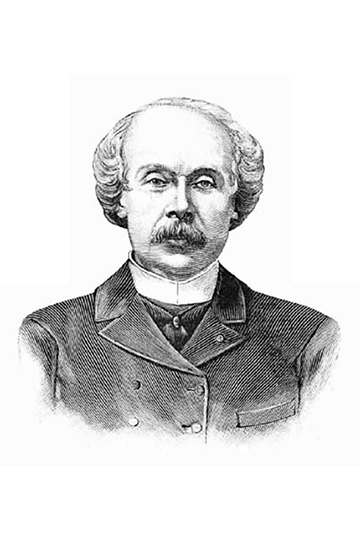
Adolphe d’Ennery
Adolphe d’Ennery is a French dramatic author, born in Paris 1811, died there 1899. By turn a lawyer's clerk, painter, and journalist, in 1831 he made more than 280 plays, no less than five of them having been produced upon the Paris stage at one time. He adapted his work to the taste of the public, and achieved success upon success, rapidly making a fortune. His wealth allowed him to contribute to the Société Thermale of Cabourg-Dives, of which he became acting manager. This society, which was composed in large measure of wealthy journalists and theatrical capitalists, placed him at its head. D'Ennery wrote under the names of Adolphe d'Ennery, Philippe d'Ennery, and Eugène d'Ennery. His plays were mainly written in collaboration with others, among whom were G. Lemoine, Alexandre Dumas, Eugène Grangé, Dumanoir, Mallian, Cormon, Hector Crémieux, Plouvier, Charles Edmond, and Lambert Thiboust.
-
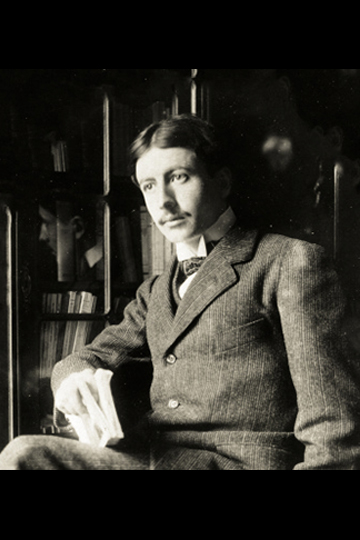
Alain Fournier
Alain-Fournier was the pseudonym of Henri-Alban Fournier (3 October 1886 – 22 September 1914), a French author and soldier. He was the author of a single novel, Le Grand Meaulnes (1913), which has been filmed twice and is considered a classic of French literature. The book is based partly on his childhood. Alain-Fournier was born in La Chapelle-d'Angillon, in the Cher département, in central France, the son of a school teacher. He studied at the Lycée Lakanal in Sceaux, Hauts-de-Seine, near Paris, where he prepared for the entrance examination to the École Normale Supérieure, but without success. He then studied at the merchant marine school in Brest. At the Lycée Lakanal, he met Jacques Rivière, and the two became close friends. In 1909, Rivière married Alain-Fournier's younger sister Isabelle.He interrupted his studies in 1907 and from 1908 to 1909 he performed his military service. At this time he published some essays, poems and stories which were later collected and re-published by the name Miracles.Throughout this period he was contemplating what would become his celebrated novel, Le Grand Meaulnes. On the first of June 1905, Ascension day, while he was taking a stroll along banks of the Seine he met and spoke with Yvonne Marie Elise Toussaint de Quiévrecourt. He became enamoured, but it was not reciprocated. The next year on the same day he waited for her at the same place, but she did not appear. That night he told Rivière, "She did not come. And even if she had, she would not have been the same". They did not meet again until eight years later, when she was married with two children. Yvonne de Quiévrecourt would become Yvonne de Galais in his novel.
-
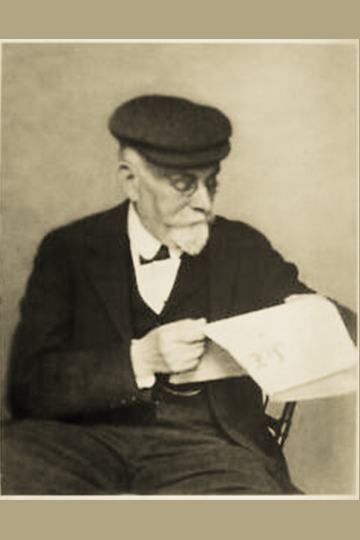
Albert Cim
Albert-Antoine Cimochowski, called Albert Cim, (22 October 1845 – 8 May 1924) was a French novelist, literary critic and bibliographer. Born to a French mother and a Polish officer who fled to France after the 1830 November Uprising, Albert Cimochowski entered in Paris a public service career for the Postes et télégraphes in 1861 and, under the name Albert Cim, began in journalism by writing articles on philology, criticism and bibliography, pieces that were quickly noticed. He collaborated with many newspapers including "lights" ones (La Gaudriole) and held the Revue littéraire column of Le Radical from 1881 to 1894, then of the National from 1895 to 1897. Meanwhile, he published books for children and novels, which earned him to be five-time winner of the Académie française, and documentary, literary and bibliographic studies. In 1896, he was appointed a librarian by the Under Secretary for Postes and telegraphs. He was also a member of the Société des gens de lettres of which he was twice the vice-president.
-
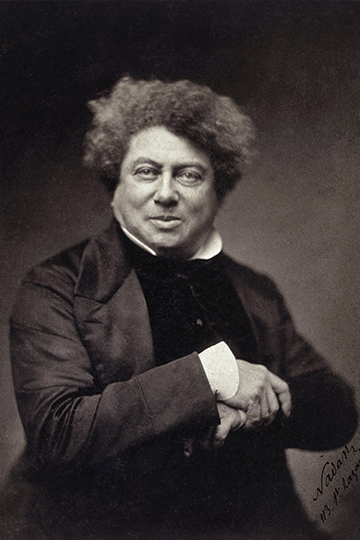
Alexandre Dumas
Alexandre Dumas was born Dumas Davy de la Pailleterie (24 July 1802 – 5 December 1870), also known as Alexandre Dumas père (where père is French for 'father', thus 'the elder/senior'), was a French writer. His works have been translated into many languages, and he is one of the most widely read French authors.Dumas Davy de la Pailleterie (later known as Alexandre Dumas) was born in 1802 in Villers-Cotterêts in the department of Aisne, in Picardy, France. He had two older sisters, Marie-Alexandrine (born 1794) and Louise-Alexandrine (1796–1797). Their parents were Marie-Louise Élisabeth Labouret, the daughter of an innkeeper, and Thomas-Alexandre Dumas.Thomas-Alexandre had been born in the French colony of Saint-Domingue (now Haiti), the mixed-race, natural son of the marquis Alexandre Antoine Davy de la Pailleterie, a French nobleman and général commissaire in the artillery of the colony, and Marie-Cessette Dumas, an enslaved woman of Afro-Caribbean ancestry. At the time of Thomas-Alexandre's birth, his father was impoverished. It is not known whether his mother was born in Saint-Domingue or in Africa, nor is it known from which African people her ancestors came.Brought as a boy to France by his father and legally freed there, Thomas-Alexandre Dumas Davy was educated in a military school and joined the army as a young man. As an adult, Thomas-Alexandre used his mother's name, Dumas, as his surname after a break with his father. Dumas was promoted to general by the age of 31, the first soldier of Afro-Antilles origin to reach that rank in the French army.
-
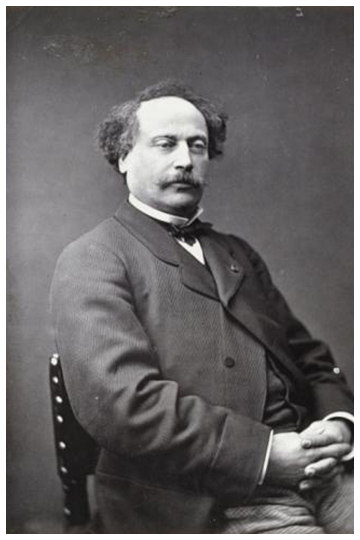
Alexandre Dumas-fils
Alexandre Dumas fils 27 July 1824 – 27 November 1895) was a French author and playwright, best known for the romantic novel La Dame aux Camélias (The Lady of the Camellias), published in 1848, which was adapted into Giuseppe Verdi's 1853 opera La traviata (The Fallen Woman), as well as numerous stage and film productions, usually titled Camille in English-language versions.Dumas fils (French for 'son') was the son of Alexandre Dumas père ('father'), also a well-known playwright and author of classic works such as The Three Musketeers. Dumas fils was admitted to the Académie française (French Academy) in 1874 and awarded the Légion d'honneur (Legion of Honour) in 1894.
-
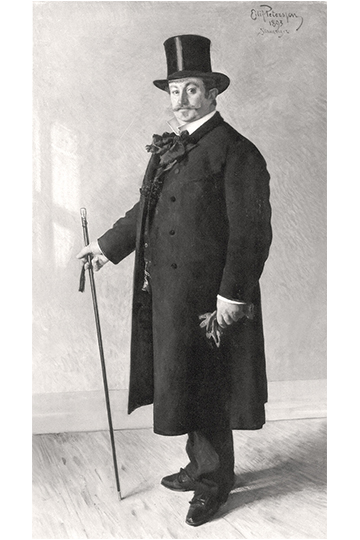
Alexandre Kielland
Alexander Lange Kielland (Norwegian: 18 February 1849 – 6 April 1906) Born in Stavanger, Norway, he grew up in a rich merchant family. He was the son of consul Jens Zetlitz Kielland and great-grandson of Gabriel Schanche Kielland (1760–1821). Kielland was the younger brother of Norwegian landscape painter Kitty Lange Kielland.He was one of the most famous Norwegian realistic writers of the 19th century. He is one of the so-called "The Four Greats" of Norwegian literature, along with Henrik Ibsen, Bjørnstjerne Bjørnson and Jonas Lie.
-
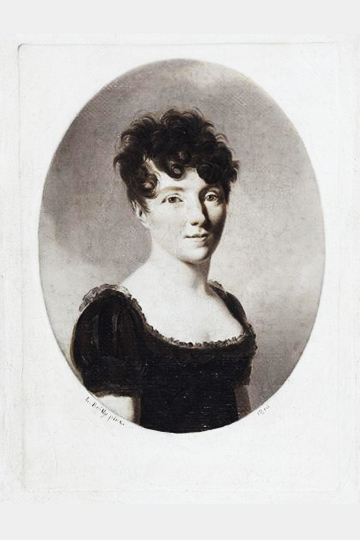
Alexandrine-Sophie de Baw...
Baroness Sophie de Bawr (8 October 1773 – 31 December 1860), born Alexandrine-Sophie Goury de Champgrand, was a French writer, playwright and composer, also known as "Comtesse de Saint-Simon", "Baronne de Bawr", and "M. François". She was born in Paris, the illegitimate daughter of Marquis Charles-Jean de Champgrand and opera singer Madeline-Virginie Vian. She was raised by her father, and studied music with André Grétry, Nicolas Roze and Adrien Boieldieu and singing with Pierre Garat and Jean Elleviou.
-
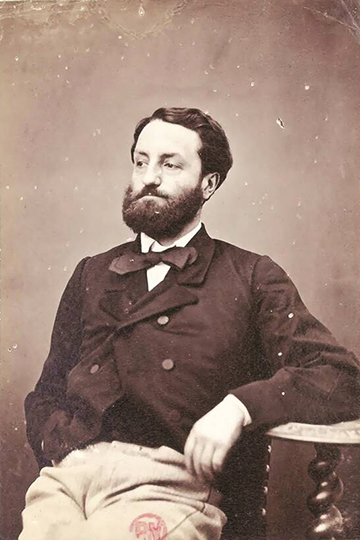
Alfred Assollant
Alfred Assollant was born in 20 mars 1827. He was a teacher, journalist, writer and outspoken opponent of Napoleon III. He wrote more than thirty books over thirty years, including historical fiction, collected essays and a treatise on the rights of women, but only The Marvellous (But Authentic) Adventures of Captain Corcoran, published in 1867, was a success. In the 1870s, his wife, son and daughter died in quick succession and Assollant found himself poverty-stricken. In 1886 he also died.